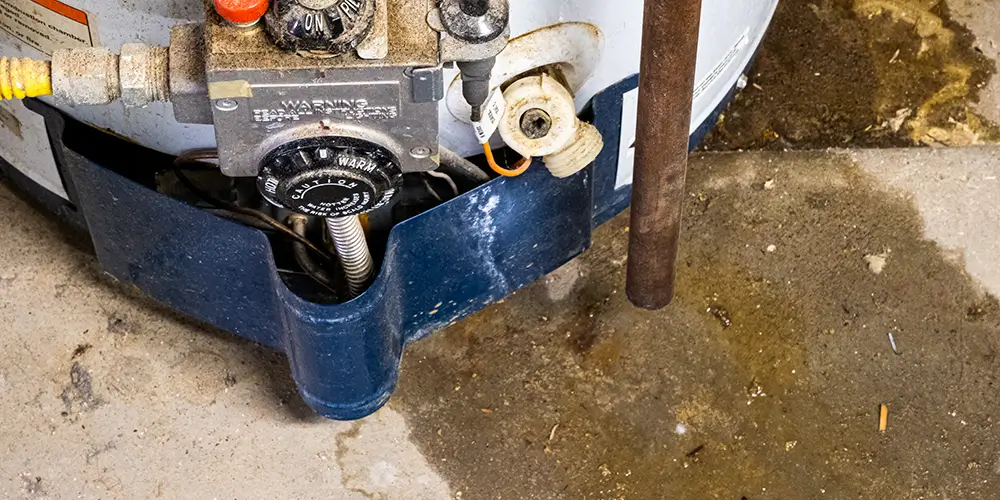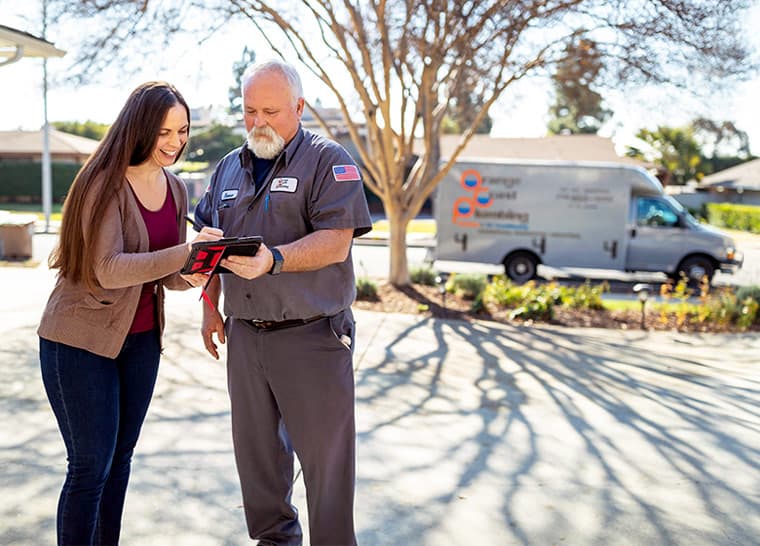When a water heater leaks, it usually comes from either the top or the bottom.
Leaks from the top are no biggie, usually involving a valve replacement or tightening of the water lines.
Leaks from the bottom are more concerning. They could be due to:
- A loose valve;
- Condensation;
- A problem with the water tank.
Let’s hope for your sake it isn’t Door Number 3.
Whatever the source, you should take the leak seriously. Fix it yourself if you can; call the plumber if you can’t. Leaks can damage flooring and objects stored nearby, and quickly turn from trickles to torrents.
Standard water heaters may last 10 –15 years. Orange County’s notoriously hard water takes a few months off the life of any appliance that comes in contact with it.
So if your water heater is approaching the 10-year mark, you may consider replacing it with a tankless heater that lasts twice as long and provides almost unlimited hot water on demand.
In the meantime, here’s how to troubleshoot that leak.
Common Causes of a Water Heater Leak
1. A Loose Drain Valve
All tanked water heaters have a drain valve. This brass or plastic valve looks like a water tap and sits at the base of the heater for good reason.
The drain valve lets you empty the tank periodically (at least 1 per year is our recommendation) to remove sediment buildup that degrades heater performance and water quality.
The drain valve should be closed tight, and its base should have a watertight seal with the tank.
Sealing the valve is an easy enough DIY repair, or even replacing it if need be.
2. Water Condensation
Condensation creates “phantom leaks” — the appearance of leaks, but no actual leaking.
Condensation forms when the temperature of the water inside your heater’s tank falls well below the temperature of the surrounding air. This situation is rare for a water heater but can happen when hot water is exhausted (by the teen taking the 40-minute shower) and very cold water enters the tank from outside lines.
Condensation may drip down the side of the heater and leave water spots that mimic a small leak.
3. An Aging Water Heater with a Corroded Tank
There’s no consensus on the lifespan of a water heater. Estimates vary from 7 to 15 years, but you can bet that 15 years is the upper limit.
Beyond 10 years of use, you should expect increasing problems, corrosion being the most serious.
Several factors influence water heater life:
- The unit’s brand and design
- The water heater’s location
- The quality of your local water supply
- How well the unit has been maintained
- The skill of the plumber who installed the unit
Once the water tank corrodes, your only option is to install a new heater and be quick about it.
4. A Faulty Temperature and Pressure Relief (T&P) Valve
The temperature and pressure relief valve is a crucial safety feature on all tank-style water heaters.
It’s designed to release excess water and pressure inside the tank, preventing potential explosions. However, a faulty or dirty valve may leak.
If you notice consistent leaking from the T&P valve, verify that it’s tightened correctly and free of obstructions. If the issue persists, replacing the valve is typically a straightforward fix.
5. A Damaged or Worn-Out Anode Rod
The anode rod prevents the tank from rusting by attracting corrosive elements in the water. Over time, it corrodes and may wear out completely.
If this happens, the tank’s inner lining can also begin to corrode, leading to leaks, especially at the bottom of the unit. Inspecting and replacing the anode rod every few years can extend the life of your water heater and prevent leaks caused by internal corrosion.
Conclusion
Small leaks in the tank are warning signs of impending failure, where the water heater can release many gallons of water into your home, garage, or wherever it’s located.
Orange Coast Plumbing offers free estimates for water heater installation and guarantees all work. Call us today if you suspect your heater has begun its transition to the afterlife. We’ll install a new, energy-efficient unit for you, and haul your old heater to the recycling yard where it can be among friends.
FAQs: More about Water Heater Leaks
Q: What should I do if I notice a water heater leak?
Turn off the power and water supply to the heater. Assess the situation and attempt any simple DIY fixes. If the problem persists, contact a professional plumber immediately.
Q: How can I identify the source of the leak?
Carefully inspect the area around the heater for moisture. Check the drain valve and fittings for tightness, look for signs of corrosion on the tank, and observe if condensation is forming. If unable to determine the source, call a plumber.
Q: Can I repair a leaking water heater myself?
For minor issues like a loose drain valve, yes. However, if the tank is corroded or there are significant leaks, hire a licensed plumber for safety and proper handling.
Q: How often should I check my water heater for leaks?
It’s a good idea to check your water heater at least every six months. Always perform annual inspections, especially before winter when external temperatures drop.
Q: What’s the average lifespan of a water heater?
Standard water heaters generally last between 10 and 15 years. Factors like maintenance, water quality, and usage can significantly affect the lifespan.
Q: How does hard water affect my water heater?
Hard water can lead to mineral buildup inside the tank, contributing to sediment formation and reduced efficiency. It may also shorten the lifespan of the heater.
Q: What are the signs of a failing water heater?
Common signs include rust or corrosion on the tank, inconsistent water temperature, unusual noises, and, of course, leaks. If you notice any of these, it may be time to consult a plumber.
Q: Is it worth getting a tankless water heater?
Tankless water heaters offer several benefits, including longer lifespan, energy efficiency, and providing a continuous supply of hot water, making them an attractive option for long-term savings.
Q: How can I prevent leaks in my water heater?
Regular maintenance, including flushing the tank annually, checking the anode rod, and monitoring for signs of wear or corrosion, can help prevent leaks and extend the life of your water heater.
Q: What should I do if my water heater floods my home?
Turn off the water supply and power to the unit. Remove valuables from the area and contact an emergency plumber to resolve the situation. Make sure to document any damage for your insurance claim.
Schedule Service


